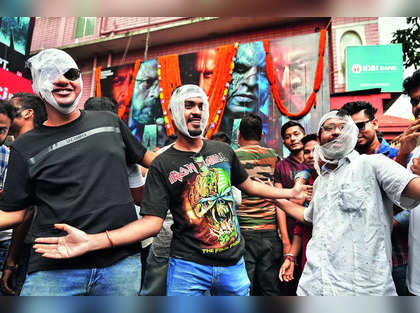
When I watched Khakee in a Dehradun single-screen, a row of young men lit up cigarettes each time Ajay Devgn (then still Devgan) lit up. Once, my mother and I watched Jodie Foster's Money Monster all by ourselves. The manager first argued that he needed a quorum, at least 10-15 people. Otherwise, it wasn't financially feasible. After some pleading, he agreed, but warned us that it would be an eerie experience. It was.
I recently watched Jawan at 10.30 pm, the day's last show. The two 70-plus ladies sitting behind me were not impressed and yawned loudly. In the interval, they let loose. One said that she prefers Netflix because she can start a film and abandon it halfway. The other said that SRK has lost his mind. And then, in the spirit of democracy, added Big B to the list. They both agreed that 'Aaj kal koi picture ka matlab nahin.' They distracted themselves in the long interval by reading aloud in unison the slide on the screen: 'Good movies get better with good snacks.'
Which brings us to the super hit film itself, Shah Rukh Khan's second worthy action blockbuster of the year. The Angry Young Man fighting the system is back. The 1980s formula is back: bullets being pulled out with tweezers, the double role, the 'entry' of the hero, the special appearance, plenty of flashbacks and backstory, songs to lighten the mood, and hundreds of extras dancing and fighting.
And yet, this is an old formula with a new twist. It's not just spectacularly choreographed fight sequences. This is SRK staking a claim to his Bharat, and projecting himself as the saviour of the people, not the RWA uncle-type, but the little Indian. It's not just him alone. Accompanying our Robin Hood is a merry band of girls shooting, punching, and cyber-hacking, all for a good cause.
The story draws from real-life incidents - farmer's suicides, babies dying because of a lack of oxygen cylinders, ill-equipped government hospitals, cash for votes, dodgy guns sold by dodgy arms dealers, which fail our army in battle situations. All these headlines are humanised - in between the dishum-dishum - making for a perfect blend of the ultra-commercial and the ultra-serious.
The overarching argument is against corruption with a big C: the corrupt neta, who, in cahoots with the unscrupulous industrialist, sells the common man short, destroying our environment and looting India's resources. A Left-leaning line runs through the film, best embodied in the dialogue that compares the rate of interest on loans given to a farmer (higher) vis-a-vis someone buying a Mercedes (lower). Then comes the famous monologue at the end, which implores the public not to be misled by politicians who ask for votes in the name of 'jaat-paat' and to vote intelligently for issues that matter, like health and education.
Jawan's mega success provokes the question: what does it tell us about the mood of the nation? Both politicians and film stars are in the same game - get the public on their side. The former wants our vote, the latter a movie hall ticket. Jawan counters what the current political dispensation would like us to believe: that we live in 'Amrit Kaal'. With national elections around the corner, could this be a harbinger of things to come, the two ladies in the auditorium notwithstanding?
The writer is author, The Butterfly Generation: A Personal Journey into the Passions and Follies of India's Technicolour Youth








 Get Unlimited Access to The Economic Times
Get Unlimited Access to The Economic Times

